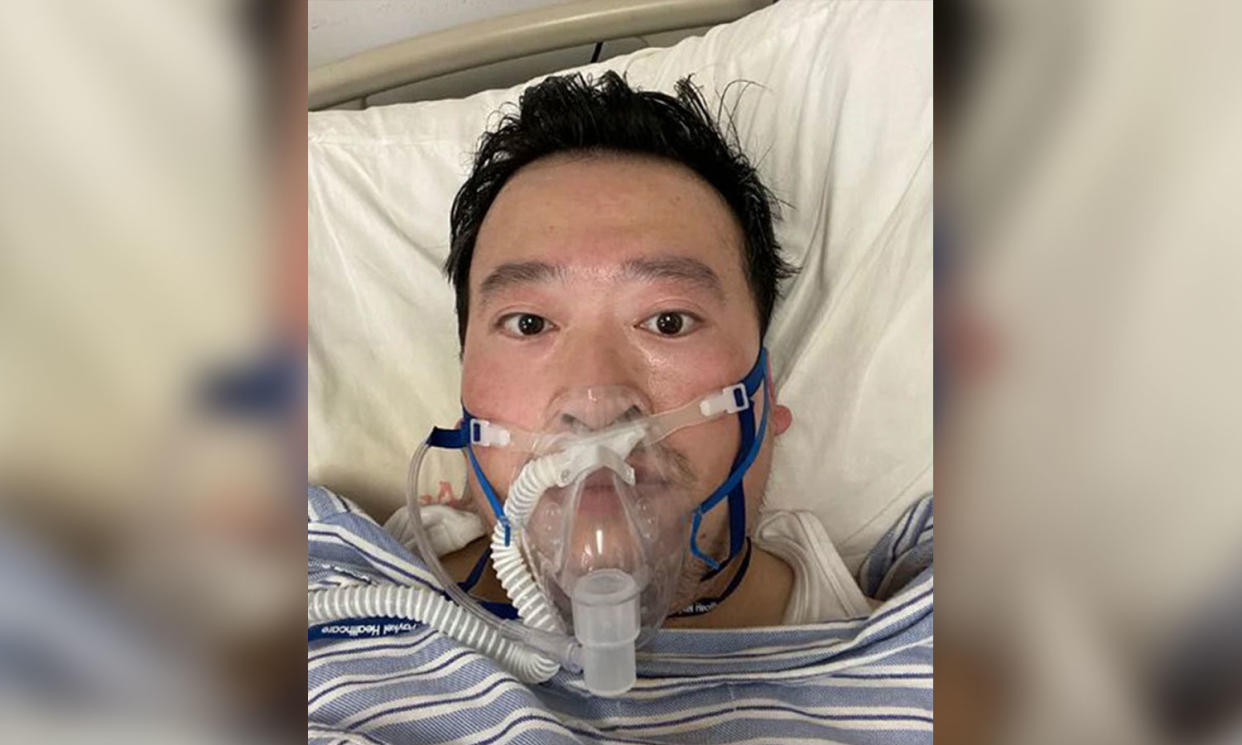Chinese doctor punished for warning people about coronavirus now has the illness

A Chinese doctor who was one of the first people in the medical community to flag coronavirus as a public threat now has the virus himself — and he’s speaking out about how the Chinese government silenced him.
On December 30, Li Wenliang, a 34-year-old ophthalmologist in Wuhan, China, told his medical school alumni group on the Chinese messaging app WeChat that seven patients from a local seafood market had been diagnosed with a serious respiratory illness and were in quarantine in his hospital. Li told his friends, per CNN, that a test he had seen indicated that it was coronavirus, a group of viruses that includes SARS (severe acute respiratory syndrome). "I only wanted to remind my university classmates to be careful," Li told CNN.
Li said he advised his friends to warn their loved ones in private, but soon screenshots of his message went viral, and his name was clearly visible. "When I saw them circulating online, I realized that it was out of my control and I would probably be punished," he said.
Not long after posting the message, Li was accused by Wuhan police of spreading rumors. He was called by hospital officials to explain how he knew about the virus and, a few days later, he was summoned to a local police station and rebuked for "spreading rumors online" and "severely disrupting social order" over his WeChat message.
Li said he was scared he was going to be arrested. "My family would worry sick about me, if I lose my freedom for a few days," he said.
He reportedly had to sign a statement that acknowledged he committed a misdemeanor and promised not to commit further "unlawful acts." He was allowed to leave the police station after an hour.
The doctor went back to work. "There was nothing I could do. [Everything[ has to adhere to the official line,” he said. Li ended up unknowingly treating a patient with coronavirus on January 10; he started coughing and developed a fever the next day. Li was hospitalized on January 12 and was eventually admitted to the intensive care unit and given oxygen support. He tested positive for coronavirus on February 1.
Wuhan police have been criticized by the international community in the way they’ve handled the coronavirus outbreak. The virus has now infected 20,704 people worldwide and caused 427 deaths, according to data gathered by Johns Hopkins University.
In early January, Wuhan police announced on Weibo (China’s Twitter-like platform) that they had "taken legal measures" against eight people who had recently "published and shared rumors online" about coronavirus and "caused adverse impacts on society."
"The internet is not a land beyond the law ... Any unlawful acts of fabricating, spreading rumors and disturbing the social order will be punished by police according to the law, with zero tolerance," the police statement read.
Eventually, the Chinese government revealed that there was an outbreak of novel coronavirus — a form of coronavirus that was not previously known to infect humans. Wuhan mayor Zhou Xianwang also later admitted on CCTV, China’s state-run TV network, that his team didn’t share information about coronavirus "in a timely fashion."
What are the dangers of silencing doctors?
This was an “unfortunate but expected situation, based on how China views anything that creates disruption to their society,” infectious disease expert Amesh A. Adalja, MD, senior scholar at the Johns Hopkins Center for Health Security, tells Yahoo Lifestyle. “We encourage doctors to be this vocal. It’s how we find out about outbreaks.”
Richard Watkins, MD, an infectious disease physician in Akron, Ohio, and an associate professor of internal medicine at Northeast Ohio Medical University, agrees. “[Li] was just looking out for the public good,” Watkins tells Yahoo Lifestyle. “To punish him is absurd and very short-sighted.”
When doctors are scared to come forward about new developments they spot, things can go very wrong, very quickly, William Schaffner, MD, an infectious disease specialist and professor at the Vanderbilt University School of Medicine, tells Yahoo Lifestyle. “Hiding infectious diseases never works. The infections always get out,” he says.
When doctors are scared to speak up, it can have a “chilling effect,” Adalja says. “You can see doctors not wanting to do what’s right because they’re afraid for their safety and liberty,” he says. “That can have cascading effects that would basically end up leaving large gaps in communication available to the public. That can make outbreaks worse.”
Could the coronavirus outbreak have been prevented if doctors were allowed to speak up?
Schaffner says, while that allowing doctors in China speak up early would not necessarily have prevented the outbreak, it might have helped limit the spread of the virus. In the U.S., doctors are encouraged to alert their local or state health department if they “see an event that might have public health implications,” Schaffner explains. From there, health officials can determine what is happening and what measures need to be taken to contain the situation, which may include warning the public. Once people are aware of an illness that may be a threat, they can take the right precautions and potentially help prevent or limit an outbreak, Schaffner tells Yahoo Lifestyle.
Allowing doctors like Li to sound the alarm “would have gotten the world ready earlier,” Adalja says. “We could have been more proactive, setting up surveillance and putting systems in place,” he adds. “The earlier we would have known about this, the better.”
Read more from Yahoo Lifestyle:
Follow us on Instagram, Facebook and Twitter for nonstop inspiration delivered fresh to your feed, every day.
